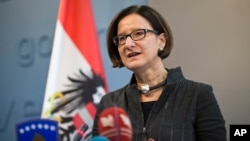Austria said Wednesday that it might be forced to reinstate border controls with Hungary after Budapest refused to take in asylum seekers sent to it by other European Union states.
The row between the two EU neighbors has further weakened the already fragile unity in Europe over how to share the burden of a rising tide of migrants.
Several countries on the EU's periphery say the system for tackling migration is broken. But Hungarian Prime Minister Viktor Orban's decision to halt transfers of asylum seekers is the most radical step taken by any European leader so far.
Orban has a history of tangling with Brussels. European Commission President Jean-Claude Juncker, in a barbed joke, once described him as a "dictator." Orban, meanwhile, is under political pressure at home from an anti-immigrant far-right opposition party.
Under EU rules, migrants must apply for asylum in the first member state they enter. If they move on to another EU country, they can be sent back to the country where they entered.
Hungary said it was temporarily suspending accepting such return transfers because it was overwhelmed by migrants, after 61,000 crossed into the country from outside the EU since the start of the year. That angered Austria, where many migrants head after passing through Hungary.
"Hungary's decision is completely unacceptable for us," Austrian Interior Minister Johanna Mikl-Leitner said on Austria's ORF radio station, adding that "we do not rule out border controls as a last resort."
That would involve passport checks on the Austrian-Hungarian border - something that ended when the two countries implemented the Schengen agreement on border-free travel nearly a decade ago.
Austria itself stopped processing asylum requests this month, in an effort to pressure other EU states to do more to help absorb waves of refugees.
EU Principles Tested
Freedom of movement across internal borders is a fundamental principle of the EU, but hundreds of thousands of non-EU migrants — many trying to head north to countries such as Germany or Sweden — are testing commitment to that ideal.
In Berlin, the head of the Europe department in the Foreign Ministry received Hungary's ambassador to Germany for talks.
The Germans made clear their expectation "that despite the burdens to which Hungary also sees itself exposed in the refugee crisis, responsibilities in the joint European asylum system cannot be unilaterally questioned," a ministry official said.
On Tuesday, after Budapest announced it was suspending transfers, the Hungarian ambassador came to the Foreign Ministry in Vienna and was asked to provide an explanation.
Hungary stood its ground. Foreign Minister Peter Szijjarto said Austria and other EU states were planning to send back to Hungary illegal immigrants who should instead be sent to Greece.
"We do not agree with this," he told reporters. He denied his government was violating EU rules.
Hungarian EU Ambassador Peter Gyorkos said it had not taken any formal legal action to suspend its participation in the Dublin Convention, which established the transfer rules.
"What happened yesterday is that our government said, 'I cannot do more,' " he said. "It's not a suspension, it's simply a request to show solidarity with us for a limited period of time."
Conflicts in the Middle East and Africa and a breakdown of order in states along the southern Mediterranean coast have driven the migrants to try to reach Europe. Countries such as Italy, Greece and Malta, where migrants make landfall after crossing the Mediterranean, have borne the brunt of the influx.
But there is also an overland route into Hungary. Budapest said it had to deal with the flow without enough help from Brussels.
Orban's government earlier this month ordered the construction of a fence along Hungary's border with Serbia to keep people from crossing illegally.





